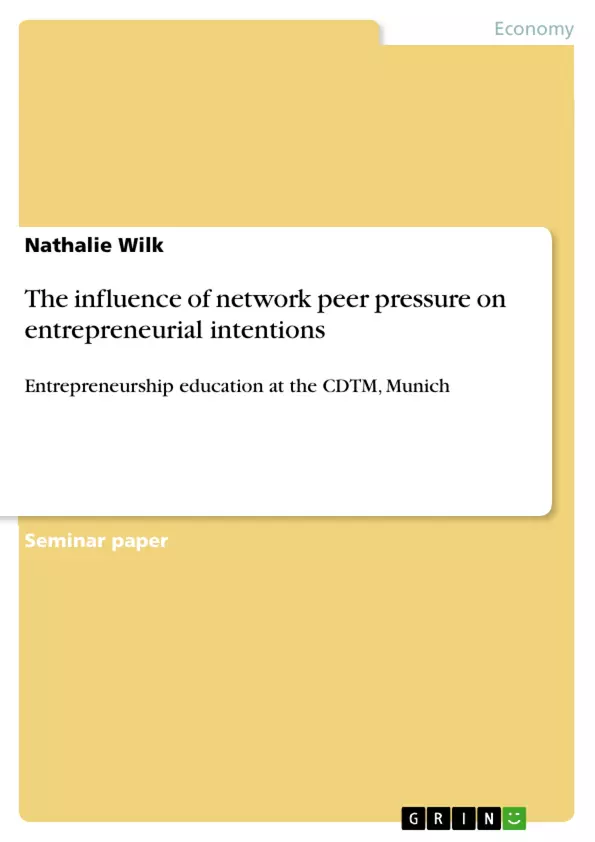The aim of this paper is to examine the relationship between network, peer pressure and entrepreneurial intentions. The impact of network peer pressure is investigated using the example of the entrepreneurship study program at the Center for Digital Technology and Management (CDTM) in Munich. The research is conducted as part of the seminar „Entrepreneurial networks and family businesses“ at TUM, Munich.
This paper follows a qualitative case study design, well-suited in early stages of research or when a fresh perspective is needed like here in the case of observing peer pressure effects in a different context as done before. Data sources were semi structured interviews and a literature review.
Whereas effects of peer pressure have been seen rather negatively in previous literature, the results of this study shows that in the case of the observed network CDTM a lot of positively perceived peer support could be noticed, inspiring entrepreneurial intentions and easing the founding process.
The results of this paper could be of interest for both practicioners and scientists. By researching about the influence of entrepreneurial education, practical implications could be derived and future research on the effects of peer pressure on entrepreneurial intentions (two concepts which have not been put into context so far) might be inspired.
Inhaltsverzeichnis (Table of Contents)
- Abstract
- Introduction
- Main part
- Term definition
- Research question
- Theoretical background
- Derived propositions
- Method
- Independent variable: network at CDTM
- The chosen case studies
- Results
- Conclusion
- Discussion
- Limitations & Future Research
- References
Zielsetzung und Themenschwerpunkte (Objectives and Key Themes)
This seminar paper investigates the impact of network peer pressure on entrepreneurial intentions. It utilizes the entrepreneurship study program at the Center for Digital Technology and Management (CDTM) in Munich as a case study to explore this relationship. The research aims to understand how social influence within the CDTM network influences students' intentions to start their own businesses.
- The role of peer pressure in shaping entrepreneurial intentions
- The impact of network dynamics on entrepreneurial behavior
- The potential for positive peer pressure within entrepreneurship education programs
- Examining the interplay between networks, peer pressure, and entrepreneurial intentions
- Investigating the effects of entrepreneurship education on individual's decision to start a business.
Zusammenfassung der Kapitel (Chapter Summaries)
- Abstract: This paper examines the relationship between network, peer pressure, and entrepreneurial intentions. The study focuses on the entrepreneurship program at CDTM in Munich and utilizes qualitative case study design. The findings suggest that the network at CDTM fosters positive peer support, which can inspire entrepreneurial intentions and facilitate the founding process.
- Introduction: This chapter introduces the concept of social influence and peer pressure, drawing upon existing research. It highlights the prevalent focus on negative consequences of peer pressure, particularly among adolescents. The paper then shifts the focus to young adults within entrepreneurship study programs, exploring whether social pressure in this context can have positive outcomes, such as motivating individuals to start their own businesses.
- Main part (3.1 Term definition): This section defines the key terms central to the research: network, peer pressure, and entrepreneurial intentions. It provides a shared understanding of these concepts, laying the groundwork for the subsequent analysis.
- Main part (3.2 Research question): This chapter outlines the research question that guides the study: "In which way does peer pressure deriving from a person's social network influence his/her entrepreneurial intentions?" The focus is on understanding the relationship between peer pressure arising from the social network (specifically, the network created through entrepreneurship education) and students' entrepreneurial intentions. It also aims to investigate whether peer pressure in this context is perceived positively or negatively.
- Main part (3.3 Theoretical background): This chapter places the research question within the existing academic debate. It connects the research to relevant literature on peer pressure, social influence, and entrepreneurship education. The chapter highlights the existing understanding of how these concepts relate to each other and identifies gaps in the current research.
Schlüsselwörter (Keywords)
This research paper focuses on the interplay between network, peer pressure, entrepreneurship, and entrepreneurial intentions. The study utilizes the CDTM network as a case study to understand the impact of peer pressure on entrepreneurial intentions within an entrepreneurship education program. The key terms and concepts explored in this research include: network, peer pressure, entrepreneurship, entrepreneurial intentions, social influence, entrepreneurship education, CDTM network, and case study methodology.
Frequently Asked Questions
What is the main focus of this research paper?
The paper examines the relationship between social networks, peer pressure, and entrepreneurial intentions, specifically focusing on students at the Center for Digital Technology and Management (CDTM) in Munich.
How does peer pressure affect entrepreneurial intentions according to the study?
Contrary to many studies that view peer pressure negatively, this research found that within the CDTM network, peer pressure is often perceived as positive support that inspires entrepreneurial intentions and eases the founding process.
What methodology was used in this paper?
The research follows a qualitative case study design, utilizing semi-structured interviews and an extensive literature review to gather data.
What is the significance of the CDTM in this research?
The CDTM (Center for Digital Technology and Management) serves as the primary case study to observe how a specific entrepreneurial education network influences the career intentions of its members.
What are the practical implications of these findings?
The results suggest that entrepreneurship education programs can foster positive peer environments to motivate students to start their own businesses, providing a fresh perspective for both practitioners and scientists.
- Citation du texte
- Nathalie Wilk (Auteur), 2016, The influence of network peer pressure on entrepreneurial intentions, Munich, GRIN Verlag, https://www.grin.com/document/368325



